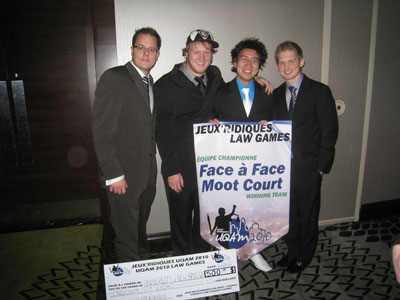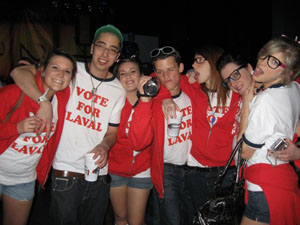The University of New Brunswick proved it had no problem winning an argument with the rest of the country when it came to the moot debate competition at the 2010 Law Games.
“We’ve taken a bath in the Maclean’s rankings,” says delegation captain Justin DeMerchant. “But we won the debate. We’re putting UNB on the map.”
Université du Québec à Montréal hosted the 26th edition of Law Games, held from Jan. 2 to 6. Twenty law schools from across the country competed in the debates, pub crawl games, sports, and “fun games,” some of which included a giant “Guess Who?” game and a poutine-eating contest.
The 20 members of the UNB delegation had a tough time getting to Montreal because of a winter storm that swept through the Maritimes, but for DeMerchant, it was well worth it. “When they were announcing the winner I had my head down. I was so scared,” he says. “But winning it was definitely my most memorable event from the games.”
“When they were announcing the winner I had my head down. I was so scared,” he says. “But winning it was definitely my most memorable event from the games.”
While delegations do earn points for participation and bonuses for winning competitions, the university that receives the most votes from opposing captains for having the best camaraderie, fraternity, and encouragement throughout the games is considered the victor of the tournament and receives the Spirit Cup.
The University of Ottawa’s civil law and common law faculties competed as a combined delegation this year and took home the prized trophy. It was also the first time the common law faculty participated in the games.
“It says a lot that we won because we’re two completely different faculties,” says Chelsea Hermanson, the common law captain. “We didn’t even know each other before.” Laura Easton, the captain from McGill University, made no second guesses when it came time to cast her vote for U of O’s team.
Laura Easton, the captain from McGill University, made no second guesses when it came time to cast her vote for U of O’s team.
“As defending champions of the cup, I think they really deserved to win,” she says. “They were always cheering and were at every event. Some of them even helped clean up after it was over.”
While the days were reserved for the debates and sports competitions, the nights had pub crawl competitions and a movie theme night.
“Eight people from our team came in as a human airplane, dressed in flight suits with call signs written on their backs,” says Easton. “Their skit was the bar scene with Goose and Maverick [from the movie Top Gun]. I was really impressed with what our team did.”
And there was no shortage of creativity on the Université de Sherbrooke’s part either.
“Every participant was dressed up as Braveheart, with full kilts, face paint, and wigs,” says Kate Kahn, the captain from Queen’s University. “Seeing that many William Wallaces in a bar is something I won’t soon forget.”
While the true purpose of the games was about meeting new people and creating a network of law students across the country, it wasn’t always the best mindset when it came to the competitions.
“Everybody seems to like us friendly Manitobans, and we’re really bonding with the other Prairie schools,” says University of Manitoba captain, Tina Petrick. “But, unfortunately, we’re seen as non-threatening.”
But some universities have even seen the true rationale of the games lost behind a week that they see as unnecessary and cutting into classes.
“Schools seem to consider the Law Games an afterthought and no longer put value on the camaraderie, sense of fairness, and networking opportunities that the Law Games foster in our future lawyers,” says Aghi Balachandran, president of the University of Calgary Law Games delegation.
“Inevitably, conflicting school and Law Games schedules will put our school’s participation at risk of extinction.”










